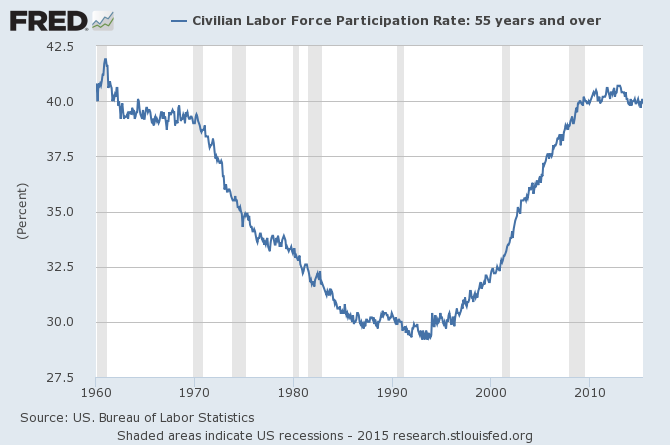|
PEOPLE AGE 55 AND OVER For the work force 55
years and over, the LFPR is quite different from that of earlier
ages. The LFPR of this group declimed from about 43% in the early
1950's to a minimum of about 29% in early 1990's. Since then,
it has been rising and continued to rise during the recession.
Now [5/15] it is about 40%. One explanation is this: "Perhaps
older Americans are being forced to work more because they have
not saved enough for their retirement. This lack of savings may
be a result of the recent economic trends in America: stagnant
wages, depleted retirement portfolios (from the 2008 financial
crisis), and rising health care costs." [http://bpr.berkeley.edu/2013/04/the-declining-labor-force-participation-rate-why-this-trend-should-be-taken-seriously/]
The age at which workers are eligible for full Social Security
benefits is rising and will affect the choices available especially
to those 62 and over. With a later age for full retirement benefits,
those retiring earlier will suffer a larger decline in monthlybenefits.
LFPR
WORKERS 55 AND OVER 1950 to May 2015

Zero
Hedge reports that since the "recovery," virtually
all job gains have gone to older workers... April [2015] merely
confirmed this demographically disastrous trend, and of the 255K
workers added in the household survey when broken down by age
group, more than all, or 266K went to workers aged 55 and older.......increasingly
old Americans are forced to work well into their retirement years
not because they want to but because they have no choice, thanks
to the Fed's ZIRP policy which has destroyed any retirement value
their savings may have had." According to the Ctr
for Retirement Research, "declines in housing wealth
during the Great Recession lowered [estimated] retirement probabilities
of married males by as much as 15 to 19 percent. This delay
was offset in cases where the household had defined benefit or
defined contribution pensions."

"Today, more than half of working households
do not have enough assets to avoid a drop in consumption in retirement,
according to analyses by Alicia H. Munnell from Boston College
and her colleagues. The proportion of households in that group
has increased by 10 percentage points in just the last 10 years."
Porter, "Doing More, Not Less, to Save Retirees From Financial
Ruin," NY Times, 6/16/15
Low-wage
Workers: Still Older, Smarter, and Underpaid, Bucknor, CEPR
5/15
|

